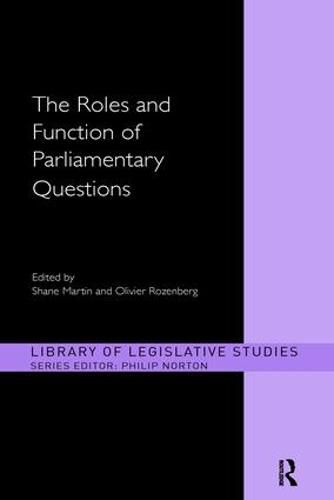Readings Newsletter
Become a Readings Member to make your shopping experience even easier.
Sign in or sign up for free!
You’re not far away from qualifying for FREE standard shipping within Australia
You’ve qualified for FREE standard shipping within Australia
The cart is loading…






Parliamentary questions are a feature of almost all national legislatures. Despite this, we know very little about how questions are used by MPs and what impact questions have on controlling the government. This volume advances our theoretical and empirical knowledge of the use of questioning in a number of different parliamentary settings. The propensity of parliamentarians to ask questions indicates that the interrogatories are an important tool for measuring an individual legislator’s job. Ultimately, how a parliamentarian chooses to use the questioning tool provides a unique insight into legislator behaviour and role orientation. Many of the chapters in this volume provide new empirical measures of legislator activity and use this data to provide new tests of leading theories of legislator behaviour.
At an institutional level, questions provide an important source of information for the chamber and are a critical tool of government oversight - as many of the chapters in the volume indicate. Evidence of the impact of questions on executive and bureaucratic oversight challenges conventional views of parliaments as weak and ineffective parts of the political process.
This book was published as a special issue of the Journal of Legislative Studies.
$9.00 standard shipping within Australia
FREE standard shipping within Australia for orders over $100.00
Express & International shipping calculated at checkout
Parliamentary questions are a feature of almost all national legislatures. Despite this, we know very little about how questions are used by MPs and what impact questions have on controlling the government. This volume advances our theoretical and empirical knowledge of the use of questioning in a number of different parliamentary settings. The propensity of parliamentarians to ask questions indicates that the interrogatories are an important tool for measuring an individual legislator’s job. Ultimately, how a parliamentarian chooses to use the questioning tool provides a unique insight into legislator behaviour and role orientation. Many of the chapters in this volume provide new empirical measures of legislator activity and use this data to provide new tests of leading theories of legislator behaviour.
At an institutional level, questions provide an important source of information for the chamber and are a critical tool of government oversight - as many of the chapters in the volume indicate. Evidence of the impact of questions on executive and bureaucratic oversight challenges conventional views of parliaments as weak and ineffective parts of the political process.
This book was published as a special issue of the Journal of Legislative Studies.